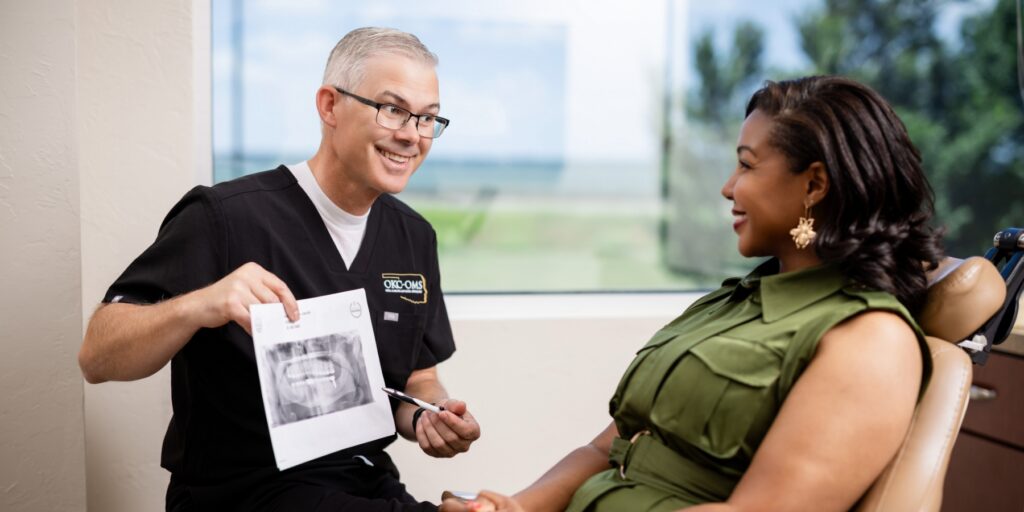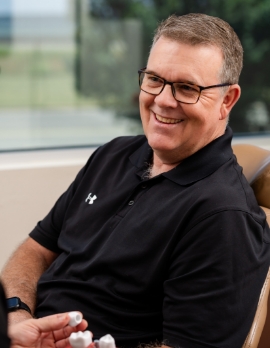
When Is an Orthognathic Surgery Needed?
Orthognathic surgery is needed when jaws don’t meet correctly and/or teeth don’t seem to fit with jaws. Teeth are straightened with orthodontics and corrective jaw surgery repositions a misaligned jaw. This not only improves our Oklahoma City patients facial appearance, but also ensures that teeth meet correctly and function properly.
The Benefits of Corrective Jaw Surgery
Corrective jaw surgery can make a dramatic difference in your life, not only enhancing the aesthetics of your smile but also making it more comfortable for you to bite, chew, and speak. Some of the primary benefits of corrective jaw surgery include:
- By correcting the misalignment of your jaw, surgical intervention can make chewing much more efficient and comfortable.
- While misalignment of the jaw can lead to premature erosion of your teeth, corrective surgery can actually preserve your dental health.
- When the jaw does not fit properly, it can lead to chronic pain. Corrective surgery provides long-term relief.
Do I Need Corrective Jaw Surgery?
People who can benefit from orthognathic surgery include those with an improper bite or jaws that are positioned incorrectly. Jaw growth is a gradual process and in some instances, the upper and lower jaws may grow at different rates. The result can be a host of problems for our Oklahoma City patients that can affect chewing function, speech, long-term oral health and appearance. Injury to the jaw and birth defects can also affect jaw alignment. Orthodontics alone can correct bite problems when only the teeth are involved. Orthognathic surgery may be required for the jaws when repositioning in necessary.
Difficulty in the following areas should be evaluated:
- Difficulty in chewing, biting or swallowing
- Speech problems
- Chronic jaw or TMJ pain
- Open bite
- Protruding jaw
- Breathing problems
Any of these symptoms can exist at birth, be acquired after birth as a result of hereditary or environmental influences, or as a result of trauma to the face. Before any treatment begins, a consultation for our Oklahoma City patients will be held to perform a complete examination with x-rays. During the pre-treatment consultation process, feel free to ask any questions that you have regarding your treatment. When you are fully informed about the aspects of your care, you and your dental team can make the decision to proceed with treatment together.
Types of Corrective Jaw Surgery
Several different jaw surgeries are available, each designed to address a specific range of pathologies. Consider some of the most common types of jaw surgery that we offer at OKC-OMS.
- Maxillary osteotomy is performed on the upper jaw, moving both the bone and teeth into proper alignment with the lower jaw.
- Mandibular osteotomy is performed to correct a lower jaw that is either protruding or receding, offering harmony with the upper jaw.
- Genioplasty corrects a chin that is either too small or is misaligned in relation to the jaw bone.
Corrective Jaw Surgery FAQ
Whether you’re curious about cost or the impact on your daily life, we’ve got you covered. Explore these frequently asked questions for a healthier, more confident smile.
Get Corrective Jaw Surgery In Oklahoma City
OKC-OMS doctors use modern computer techniques and three-dimensional models to show you exactly how your surgery will be approached. Using comprehensive facial x-rays and computer video imaging, we can show you how your bite will be improved and even give you an idea of how you’ll look after surgery. This helps you understand the surgical process and the extent of the treatment prescribed. Our goal is to help you understand the benefits of orthognathic surgery.
If you are a candidate for corrective jaw surgery, Our doctors will work closely with your dentist and orthodontist during your treatment. The actual surgery can move your teeth and jaws into a new position that results in a more attractive, functional, and healthy dental-facial relationship. Contact us today in the Oklahoma City area to schedule a consultation.
